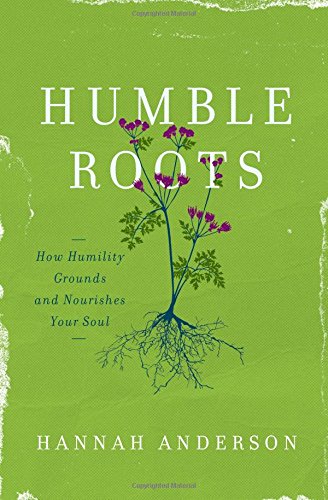Humble Roots:
How Humility Grounds and Nourishes Your Soul
by Hannah Anderson
–Review by Teri Hyrkas
When Jesus described himself as “gentle and lowly in heart”(Matthew 11:29), he was letting his listeners know that he was a typical person, a blood and bone, standard issue human being, that he did not put himself above anyone he met. During his time on earth, Jesus chose to live with and identify himself with common people of humble origins and modest means. In Jesus’ era humility was considered by his disciples to be an admirable trait, but what about in our time? Is humility even considered a virtue in post-modern Christian life? And what, if any, are the benefits of pursuing the path of humility?
In our blaring, glaring, self-centered, social media-saturated world, answers to questions about humility may be hard to formulate. In Humble Roots: How Humility Grounds and Nourishes Your Soul (Moody Publishers, 2016), author Hannah Anderson, a mother of two and wife of a pastor, gives us a way to understand humility by using earthy stories involving plants, vineyards, kitchen gardens — and her own foibles — to illustrate its meaning. She also points out the centrality of humility to the Christian faith by recalling for us that from the beginning, from the Incarnation forward, Jesus chose to “make himself nothing by taking the form of a servant, being made in human likeness….” (Phil 2:7)
In the introduction to Humble Roots, Anderson indicates that she has not written a book that can take the place of the “graces of community, pastoral counsel, professional therapy or medical intervention” for those who may be experiencing debilitating clinical anxiety or depression. Humble Roots, she writes, is “primarily a theological reflection” and should be used as such. That being said, Anderson writes freely about her lack of inner peace, about persistent restlessness and insomnia and uses her emotional struggles as a window into the reality of living with anxiety.
In every chapter of Humble Roots there are striking insights on humility and its opposite number, pride. These perceptions unfurl in and around familiar Bible texts and the author’s homey illustrations of life in rural Virginia. It is Anderson’s skill in bringing her theological commentaries and the down-home stories together that gives Humble Roots its edge.
One of the most interesting of Anderson’s tales is the story about why horticultural enthusiast President Thomas Jefferson experienced twenty-two failures in cultivating varieties of European grapes at his home in Monticello, at Charlottesville, Virginia. Anderson writes: “Years later, scientists figured out why: [The cause of the vine failure] was phylloxera, a root louse….Jefferson had little way of knowing why his European grapes repeatedly failed. He had little way of knowing that the soil of his beloved Monticello — a soil that was so productive for so many other things — was infested….
“In many ways, Jefferson’s struggle to cultivate a vineyard is similar to our struggle to cultivate humility, ” says Anderson.”Without [humility], we will continue to be agitated, anxious, and frustrated because our pride will lead us to live beyond natural limitations. But until we understand the extent to which pride infects our everyday choices, we will never be at peace.”
Anderson rounds out this section on humility and the grape vine by naming the way researchers and grape developers finally were able to successfully grow European grape vines at Monticello – they grafted the European varieties onto the stock of phylloxera resistant rootstock. Anderson concludes the chapter by saying, “We too must be grafted. If we are to find rest from our stress, if we are to have any hope of escaping our pride, we must be grafted onto the one who is humility Himself. We can no longer simply be content to imitate Him; we must become part of Him in order to reflect Him.”
Humble Roots: How Humility Grounds and Nourishes Us is an astute reminder that humility is a virtue to be sought out in every generation, even our generation of TGIF (Twitter, Google, Instagram, Facebook –Sweet). Hannah Anderson’s blending of scripture and simple life tales holds up a mirror to our culture to help us examine how humility, or the lack of it, influences our daily behavior and our ability to flourish.

